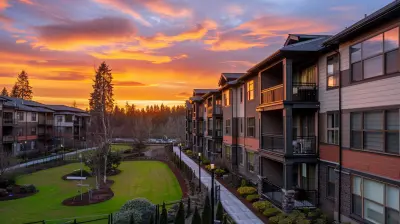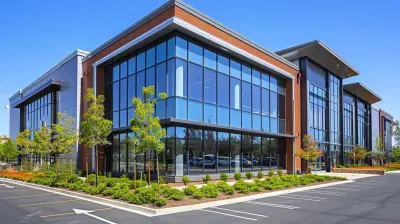How Zoning Regulations Affect Commercial Property Development
15 July 2025
When you're eyeing that perfect spot for a new commercial venture, zoning regulations might not be the first thing on your mind. But trust me, they should be. These rules can make or break your project—dictating what you can build, how big it can be, and even what kind of business you can run there.
So, let’s break it all down. How exactly do zoning laws impact commercial property development? And what should you keep in mind before making any major moves? 
What Are Zoning Regulations?
Think of zoning regulations as the rulebook for land use. Local governments use zoning laws to divide areas into different "zones," each with specific permitted uses. These zones typically include:- Commercial (for businesses, offices, and retail spaces)
- Residential (for homes, apartments, and condos)
- Industrial (for factories, warehouses, and manufacturing plants)
- Mixed-use (a blend of residential, commercial, or industrial)
These laws control everything from building height and density to parking requirements and green space. If you don’t follow them, you could face major fines—or worse, have your project shut down before it even begins. 
How Do Zoning Regulations Affect Commercial Property Development?
Zoning laws significantly influence commercial development in several ways. Here’s how they affect businesses and investors:1. Determining Land Use
Zoning laws directly dictate what kind of business you can operate in a particular location. Want to open a restaurant in a residential zone? Not happening—unless you apply for a special permit (and even then, approval isn’t guaranteed).Even within commercial zoning, there are subcategories. For example, a retail store might be allowed, but a nightclub or factory may be prohibited. That’s why doing your homework is crucial before purchasing a property.
2. Impact on Property Value
Zoning plays a huge role in property values. A commercially zoned property in a high-traffic area will typically be worth more than one in a low-traffic zone.But it’s not always straightforward. If zoning changes in an area—let’s say a residential zone is reclassified as commercial—property values can skyrocket. On the flip side, if zoning restrictions tighten, limiting development, values might drop.
3. Restrictions on Building Size and Design
You can't just build anything you want. Local governments set rules on:- Building height restrictions
- Floor area ratios (how much building space you can have relative to lot size)
- Setback requirements (how far your building must be from the street)
- Parking space minimums
If you’re planning a skyscraper but the zoning ordinance only allows three-story buildings, you’ll have to rethink your strategy.
4. Zoning Changes and Variances
If your intended use doesn’t fit an area’s zoning, you might be able to apply for a variance or a rezoning request. But these aren’t easy to get.- Variances allow minor exceptions to zoning laws (e.g., reducing a setback requirement).
- Rezoning involves changing the zoning classification of a property—something that typically requires approval from local authorities and community meetings.
Both processes can be expensive and time-consuming, with no guarantee of success.
5. Environmental and Community Considerations
Many zoning regulations focus on environmental impact—requiring green spaces, stormwater management, or noise restrictions. Some areas even have historical preservation zoning that limits how much you can modify a building.Local communities also have a say in zoning changes. If nearby residents oppose your development, you might face roadblocks, public hearings, and prolonged legal battles.
6. Infrastructure and Utility Requirements
Zoning regulations also determine the infrastructure requirements of a commercial property.- Does the area support the water, sewer, and electricity needs of a large development?
- Does the local transportation system accommodate increased traffic?
If not, you may be responsible for funding necessary infrastructure improvements, which can be costly. 
How to Navigate Zoning Regulations for Your Commercial Project
If you’re looking to develop commercial property, zoning laws aren’t something you can ignore. Here are some tips for handling them the right way:1. Research Zoning Laws Before You Buy
Before purchasing land, check its zoning classification and any restrictions that come with it. You can usually find this info on your city or county’s zoning website.2. Consult a Zoning Lawyer or Planner
Zoning laws are complex, and a small misunderstanding can lead to costly mistakes. Hiring a zoning expert can help you navigate the legal requirements and avoid potential pitfalls.3. Engage With the Local Community
If your development might face opposition, be proactive. Attend community meetings, address concerns, and propose benefits (like job creation) to gain support.4. Consider Mixed-Use Development
If zoning laws are too restrictive, a mixed-use development might be a workaround. Many cities encourage developments that combine commercial and residential spaces, leading to flexible zoning allowances.5. Apply for Variances or Rezoning (If Needed)
If your project doesn't fit the existing zoning classification, work with your legal team to apply for a variance or rezoning. Be prepared for a lengthy approval process and potential pushback.
The Bottom Line
Zoning regulations are a double-edged sword. They help maintain order and community balance but can also create challenges for commercial property developers. Whether you're building a shopping center, office complex, or restaurant, understanding zoning laws will save you time, money, and frustration.So before you break ground, do your research, consult the right people, and make sure your development plans align with municipal regulations. Your success—and sanity—depends on it.
all images in this post were generated using AI tools
Category:
Commercial Real EstateAuthor:

Vincent Clayton
Discussion
rate this article
1 comments
Vera Fletcher
Zoning regulations may seem daunting, but they can boost creativity and inspire innovative commercial developments! Keep dreaming!
August 4, 2025 at 3:58 AM

Vincent Clayton
Thank you for your encouraging perspective! Zoning regulations can indeed shape unique opportunities for creativity in commercial development.


